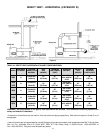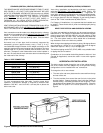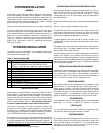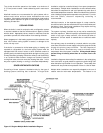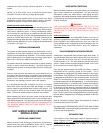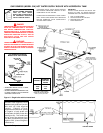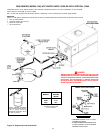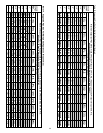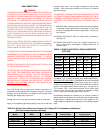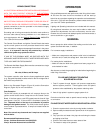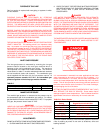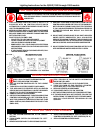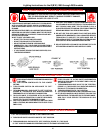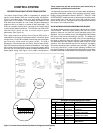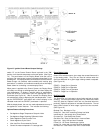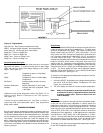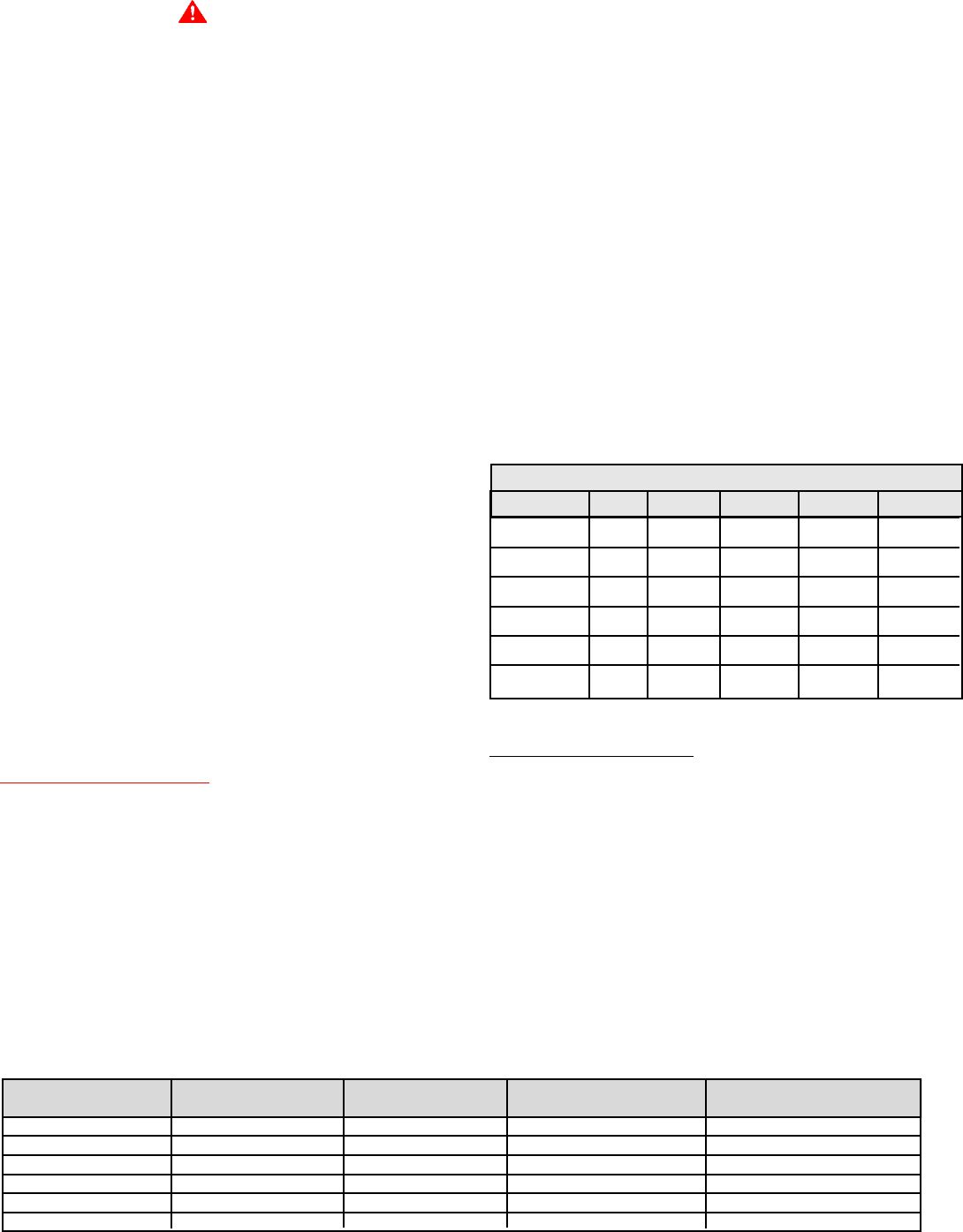
21
GAS CONNECTIONS
WARNING
THIS BOILER IS NOT INTENDED TO OPERATE AT GAS SUPPLY
PRESSURE OTHER THAN SHOWN ON THE RATING PLATE.
EXPOSURE TO HIGHER GAS SUPPLY PRESSURE MAY CAUSE
DAMAGE TO GAS VALVES WHICH CAN RESULT IN FIRE OR
EXPLOSION. IF OVERPRESSURE HAS OCCURRED SUCH AS
THROUGH IMPROPER TESTING OF GAS LINES OR EMERGENCY
MALFUNCTION OF THE SUPPLY SYSTEM, THE GAS VALVES MUST
BE CHECKED FOR SAFE OPERATION. MAKE SURE THAT THE
OUTSIDE VENTS ON THE SUPPLY REGULATORS AND THE
SAFETY VENT VALVES ARE PROTECTED AGAINST BLOCKAGE.
THESE ARE PARTS OF THE GAS SUPPLY SYSTEM, NOT THE
BOILER. VENT BLOCKAGE MAY OCCUR DURING ICE BUILD-UP
OR SNOW STORMS.
WHEN LOCAL CODES REQUIRE A MAIN MANUAL SHUT-OFF
VALVE OUTSIDE THE BOILER JACKET, A SUITABLE MAIN MANUAL
SHUT-OFF VALVE MUST BE INSTALLED IN A LOCATION
COMPLYING WITH THOSE CODES.
IT IS IMPORTANT TO GUARD AGAINST GAS VALVE FOULING FROM
CONTAMINANTS IN THE GAS WAYS. SUCH FOULING MAY CAUSE
IMPROPER OPERATION, FIRE OR EXPLOSION. IF COPPER
SUPPLY LINES ARE USED THEY MUST BE APPROVED FOR GAS
SERVICE.
BEFORE ATTACHING THE GAS LINE BE SURE THAT ALL GAS
PIPE IS CLEAN ON THE INSIDE.
TO TRAP ANY DIRT OR FOREIGN MATERIAL IN THE GAS SUPPLY
LINE, A DIRT LEG (SOMETIMES CALLED DRIP LEG) MUST BE
INCORPORATED IN THE PIPING. THE DIRT LEG MUST BE
READILY ACCESSIBLE AND NOT SUBJECT TO FREEZING
CONDITIONS. INSTALL IN ACCORDANCE WITH RECOM-
MENDATIONS OF SERVING GAS SUPPLIERS. REFER TO
NATIONAL FUEL GAS CODE, ANSI Z223.1 OR CAN/CSA -B149.1
AND .2 (AND LATEST ADDENDA).
Gas Pipe sizing may be larger than heater connections on
installations where a significant run of piping is required. To prevent
damage, care must be taken not to apply too much torque when
attaching gas supply pipe to gas inlet.
Fittings and unions in the gas line must be metal to metal type.
Apply joint compounds (pipe dope) sparingly and only to the male
TABLE 16. Orifice Size for Natural and Propane (LP) Gases (U.S. and Canadian Installations)
[Drill size unless otherwise indicated.]
Rating Input Number of
Model BTUH Burners Natural (Holes) Propane (Holes)
GB/GW 1000 990,000 10 0.111" (4X) 0.071" (3X)
GB/GW 1300 1,300,000 13 0.111" (4X) 0.071" (3X)
GB/GW 1500 1,500,000 15 0.111" (4X) 0.071" (3X)
GB/GW 1850 1,850,000 19 0.111" (4X) 0.071" (3X)
GB/GW 2100 2,100,000 21 0.111" (4X) 0.071" (3X)
GB/GW 2500 2,490,000 25 0.111" (4X) 0.071" (3X)
threads of pipe joints. Do not apply compound to the first two
threads. Use compounds resistant to the action of liquefied
petroleum gases.
THE BOILER MUST BE ISOLATED FROM THE GAS SUPPLY PIPING
SYSTEM BY CLOSING ITS MAIN MANUAL GAS SHUT-OFF VALVE
DURING ANY PRESSURE TESTING OF THE GAS SUPPLY PIPING
SYSTEM AT TEST PRESSURES EQUAL TO OR MORE THAN 1/2
PSIG.
1. CORRECT GAS - Make sure gas on which the boiler will operate
is the same as that specified on the rating plate. Do not install
the boiler if equipped with a different type of gas. Consult your
gas supplier.
2A. SIZING GAS SUPPLY LINE (For single boiler installations).
See table 15.
2B. SIZING GAS SUPPLY LINE (For multiple installations of
two or more boilers). See tables 13 (Natural Gas) and 14
(Propane Gas).
TABLE 15. SINGLE UNIT INSTALLATION, SUGGESTED
PIPE SIZE
DISTANCE FROM METER
BTU INPUT 0-50' 51-100' 101-200' 201-300' 301-500'
990,000 2" 2" 2 1/2" 2 1/2" 2 1/2"
1,300,000 2" 2 1/2" 2 1/2" 3" 3"
1,500,000 2" 2 1/2" 3" 3" 3 1/2"
1,850,000 2 1/2" 2 1/2" 3" 3" 3 1/2"
2,100,000 2 1/2" 3" 3" 3 1/2" 4"
2,500,000 2 1/2" 3" 4" 4" 4 1/2"
Use tables 13 or 14, which are taken from ANSI booklet Z223.1,
NATIONAL FUEL GAS CODE, or CAN/CSA-B149.1and .2 (and latest
addenda) to size iron pipe or equivalent gas supply line. Table 13
is based on a pressure drop of 0.5 inches of water and a specific
gravity of 0.60 approximately that of natural gas. (LP gas has an
S.G. of about 1.53). If the service pressure is five inches water
column or less, use one pipe size larger than specified in tables
13-15 in order to minimize pressure drop in the line.
No additional allowance is necessary for an ordinary number of
fittings. Where it is necessary to use more than the average number
of pipe fittings i.e. elbows, tees, and valves in gas supply line, use
a pipe larger than specified to compensate for increased pressure
drop.



